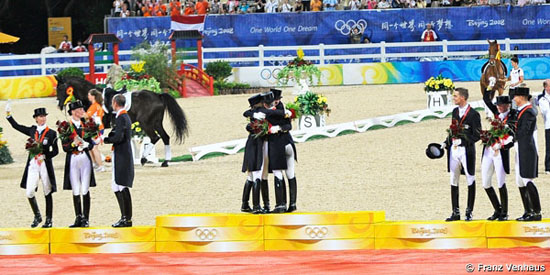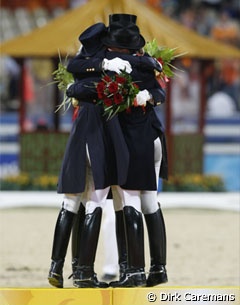
What a thrilling finals of the Grand Prix team championship competition at the 2008 Olympic Games in Hong Kong. Isabell Werth's ride aboard the Hanoverian gelding Satchmo (by Sao Paulo x Legat) bolstered the German team to recapture the team gold medal.
Germany's two other team riders, Heike Kemmer and Nadine Capellmann contributed as much to the medal as they both scored above 70% with Kemmer ranking third in the individual standing. The Dutch team captured silver and Denmark followed in bronze position, definitely feeling justification for being cheated out of team bronze by the U.S.A at the 2006 World Equestrian Games.
Isabell Werth was the third to last rider to go on Thursday evening in the stadium and everyone was bracing themselves for the ride. Dutch Anky van Grunsven was provisionally ranked first with 74.750% and Isabell had to score above 73% to put Germany in the gold. Madeleine Winter-Schulze's Satchmo looked terrific. Bouncy extended trots, superb half passes with legs reaching as much as possible. The walk was relaxed and had good overtrack. The tempi changes were all straight in the body and ground covering. Both pirouettes were executed to perfection. There was only one problem in the test in the first piaffe where Satchmo stepped on his own coronet band and kicked out. The other two piaffes were rhythmical and energetic, even though he could still sit more on the hindquarters. The passage was lovely, better engaged from behind than usual. Werth and Satchmo look extremely fit and have improved since Aachen. Their score of 76.417% made them the winners of the Grand Prix. The judges unanimously ranked the pair first, the lowest score of 75.00% coming from Dutch judge Fouarge, the highest (77.708 %) from American judge Gary Rockwell.
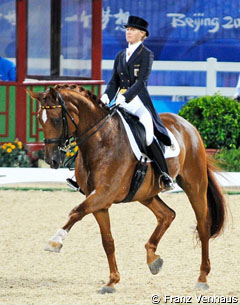 German Heike Kemmer was the provisional leader in the Grand Prix after day one with 72.250% (a score which eventually would rank her third overall) and it was crossing one's fingers for Nadine Capellmann and Elvis VA. The pair is known for having its ups and downs and Elvis VA has three phenomenal basic gaits, but rideability-wise and training-wise he is not a paragon. Capellmann always has difficulties loosening him up through the body and usually tends to hang into the bit as if trying to make it to shore safe and sound. But today in the Grand Prix, Capellmann fortunately lived up to the expectations and was able to keep her horse together. Elvis (by Espri x Garibaldi II) made lovely half passes but pushed himself a bit high in the neck. The extensions in trot were super but Capellmann was unable to keep her hands totally quiet and was halt halting visibly to get him back in the frame. The first piaffe and passage were quite good, especially the scopey passage. In the second piaffe, Elvis got a bit against the bit, which Capellmann quickly corrected. The tempi changes were good. The one time tempi's are usually Elvis' biggest issue, but he showed remarkable improvement to the one's he performed at Aachen. The pirouettes were good. On the final centerline, Elvis really came off the ground in passage, the piaffe needed to look more confirmed and confident. They scored 70.083% and assisted in Germany winning team gold.
German Heike Kemmer was the provisional leader in the Grand Prix after day one with 72.250% (a score which eventually would rank her third overall) and it was crossing one's fingers for Nadine Capellmann and Elvis VA. The pair is known for having its ups and downs and Elvis VA has three phenomenal basic gaits, but rideability-wise and training-wise he is not a paragon. Capellmann always has difficulties loosening him up through the body and usually tends to hang into the bit as if trying to make it to shore safe and sound. But today in the Grand Prix, Capellmann fortunately lived up to the expectations and was able to keep her horse together. Elvis (by Espri x Garibaldi II) made lovely half passes but pushed himself a bit high in the neck. The extensions in trot were super but Capellmann was unable to keep her hands totally quiet and was halt halting visibly to get him back in the frame. The first piaffe and passage were quite good, especially the scopey passage. In the second piaffe, Elvis got a bit against the bit, which Capellmann quickly corrected. The tempi changes were good. The one time tempi's are usually Elvis' biggest issue, but he showed remarkable improvement to the one's he performed at Aachen. The pirouettes were good. On the final centerline, Elvis really came off the ground in passage, the piaffe needed to look more confirmed and confident. They scored 70.083% and assisted in Germany winning team gold.
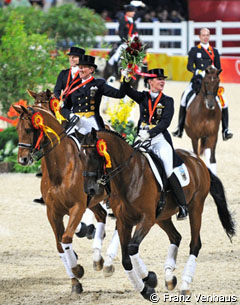 Isabell Werth was ecstatic about her ride and the gold medal. "This is a very special medal, considering the preparation," she told Horses of the Dutch reporter Fabian Brockötter. "I had a lot of stress during the training when Satchmo was spooking from the video screen. On paper, The Dutch team had wonderful results, so you don't win easily from them. But at the Olympic Games different rules count. And those rules, they didn't count for us this time, but for the Dutch. They made mistakes in their tests they usually wouldn't do," she commented, adding a note on her personal aspirations: I'm not going fully for the individual gold."
Isabell Werth was ecstatic about her ride and the gold medal. "This is a very special medal, considering the preparation," she told Horses of the Dutch reporter Fabian Brockötter. "I had a lot of stress during the training when Satchmo was spooking from the video screen. On paper, The Dutch team had wonderful results, so you don't win easily from them. But at the Olympic Games different rules count. And those rules, they didn't count for us this time, but for the Dutch. They made mistakes in their tests they usually wouldn't do," she commented, adding a note on her personal aspirations: I'm not going fully for the individual gold."
Anky van Grunsven had only one mission entering the Grand Prix ring: scoring a safe, high score for Holland so that they wouldn't loose a medal at these Olympics. Holland was expected to win gold by almost everyone. This prognostication was based on the super high scores the Dutch had been achieving at the Olympic selection trial hosted in The Netherlands, on the German Olympic hopefuls producing oscillating performances ranging between poor, mediocre and fantastic at the German Olympic selection trials, and of course on the team gold medal they won at the 2007 European Championships. However, it turned out differently for Holland. Hans Peter Minderhoud scored below 70% and Imke Schellekens-Bartels' mare Sunrise stuck her tongue out during the test.
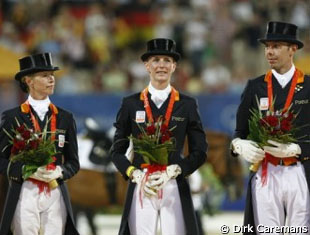 Anky was on a "save our souls" mission for the Dutch and, of course, she cleared the deed with bravura. Her Hanoverian gelding Salinero (by Salieri x Lungau) entered the ring with a clean halt. The dark bay gelding is very expressive in trot and has a gorgeous silhouette. The half passes were magnificent though the half pass to the right was less forward than the one to the left. Both trot extensions, however, did not suffice. Salinero only barely overtracked and it took him to come to X to show something that nears to an extension. All piaffes and passages were very good: energetic, rhythmical, off the ground, even though occasionally a more active left hind leg can be spotted in the passage. In the extended canter on the diagonal, Anky already started collecting Salinero a few meters after X. The tempi changes were ok, the croupe stayed low but they could have covered more ground and Salinero got a bit tight in the neck. The highlight of the test, besides the trot half passes and outstanding piaffe passage transitions, were the two pirouettes. They used to be a problem for the pair, but now both were executed very well. The final trot extension was a passage blown out of proportion with little overtrack. Salinero visibly got more excited and could not do a final halt, but piaffed his way through the salute. They achieved a score of 74.75% overall, a mark most can be very happy with though there were some major discrepancies between the judges (as usual when Anky rides) with Mandi scoring her the lowest (73.542%) and American Rockwell giving her an exaggerated 77.292%. Remarkably, Dutch judge Fouarge kept it in the middle and scored both Anky and Isabell 75.000%, not really up to reality as Isabell was much better than Anky in the Grand Prix today. Her score was an elemental contribution in the Dutch team silver which they have won back-to-back for the sixteen four years.
Anky was on a "save our souls" mission for the Dutch and, of course, she cleared the deed with bravura. Her Hanoverian gelding Salinero (by Salieri x Lungau) entered the ring with a clean halt. The dark bay gelding is very expressive in trot and has a gorgeous silhouette. The half passes were magnificent though the half pass to the right was less forward than the one to the left. Both trot extensions, however, did not suffice. Salinero only barely overtracked and it took him to come to X to show something that nears to an extension. All piaffes and passages were very good: energetic, rhythmical, off the ground, even though occasionally a more active left hind leg can be spotted in the passage. In the extended canter on the diagonal, Anky already started collecting Salinero a few meters after X. The tempi changes were ok, the croupe stayed low but they could have covered more ground and Salinero got a bit tight in the neck. The highlight of the test, besides the trot half passes and outstanding piaffe passage transitions, were the two pirouettes. They used to be a problem for the pair, but now both were executed very well. The final trot extension was a passage blown out of proportion with little overtrack. Salinero visibly got more excited and could not do a final halt, but piaffed his way through the salute. They achieved a score of 74.75% overall, a mark most can be very happy with though there were some major discrepancies between the judges (as usual when Anky rides) with Mandi scoring her the lowest (73.542%) and American Rockwell giving her an exaggerated 77.292%. Remarkably, Dutch judge Fouarge kept it in the middle and scored both Anky and Isabell 75.000%, not really up to reality as Isabell was much better than Anky in the Grand Prix today. Her score was an elemental contribution in the Dutch team silver which they have won back-to-back for the sixteen four years.
Fabian Brockötter also pinned down Anky after her ride and got the following comment out of her: "Considering the circumstances, this was the best test I could do. Salinero was very excited, even a bit nervous," Anky said. "My stake was to ride a faultfree round for the team. Yesterday, our hope for gold had gone. I didn't expect Isabell to score 3% below me."
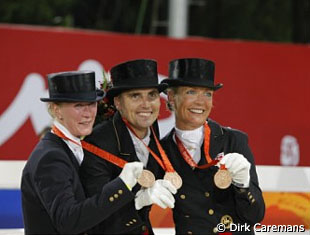 The Danish team captured the bronze medal and went completely wild with happiness as they felt truly redeemed for the injustice that happened to them at the 2006 World Equestrian Games. At the WEG Aachen, the Danes felt completely cheated out of their team bronze medal as Debbie McDonald's Brentina scored over 70% while being lame in the test. Today, fate was on the side of the Danish. They seemed to relive the 2006 scenario: McDonald once again rode an unlevel horse, but this time the judges had cleaned the glasses of their spectacles and downscored Brentina to a 63%. So the path was cleared for the Danes to go for bronze. Anne van Olst and Exquis Clearwater had scored 67.375% on day one (17th place) and Andreas Helgstrand and Nathalie Zu Saeyn-Wittgenstein were to go today. Trained by Kyra Kyrklund, Princess Nathalie and her Danish bred Digby (by Donnerhall) became the best Danish rider with 70.417% (8th). "He was totally with me from the first step," Zu Saeyn explained. Andreas Helgstrand and Blue Hors Don Schufro (by Donnerhall) followed in 14th place with 68.833%, a score below their normal 70+ average. Helgstrand rode a safe test with nice extensions and lovely passage reprises. It was an elegant and safe test.
The Danish team captured the bronze medal and went completely wild with happiness as they felt truly redeemed for the injustice that happened to them at the 2006 World Equestrian Games. At the WEG Aachen, the Danes felt completely cheated out of their team bronze medal as Debbie McDonald's Brentina scored over 70% while being lame in the test. Today, fate was on the side of the Danish. They seemed to relive the 2006 scenario: McDonald once again rode an unlevel horse, but this time the judges had cleaned the glasses of their spectacles and downscored Brentina to a 63%. So the path was cleared for the Danes to go for bronze. Anne van Olst and Exquis Clearwater had scored 67.375% on day one (17th place) and Andreas Helgstrand and Nathalie Zu Saeyn-Wittgenstein were to go today. Trained by Kyra Kyrklund, Princess Nathalie and her Danish bred Digby (by Donnerhall) became the best Danish rider with 70.417% (8th). "He was totally with me from the first step," Zu Saeyn explained. Andreas Helgstrand and Blue Hors Don Schufro (by Donnerhall) followed in 14th place with 68.833%, a score below their normal 70+ average. Helgstrand rode a safe test with nice extensions and lovely passage reprises. It was an elegant and safe test.
"After we saw Brentina, we knew the bronze was ours," Andreas Helgstrand told Ridehesten. Nevertheless, pressure was still on their shoulders and the Danes had to wait for last rider Steffen Peters to finish his round, before they could be certain of bronze. Only a 73% score would give the U.S.A. a bronze medal, and Peters has been known to score that high in the States. In the Olympic Grand Prix, Peters got stuck on a 70.000%, landing the U.S.A in a fourth team place. The pressure and tension on the Danes was unbelievably high. "I couldn't handle the pressure. I went into the stables and crossed my fingers," Zu Saeyn-Wittgenstein said.
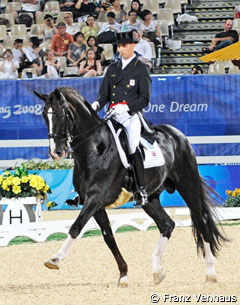 The thrill of the Olympics is that anything can happen. Though Holland did win silver, they rely totally more on Anky than ever before. Leading up the Olympics, Holland looked to be a gold medal candidate, but it turned into silver. The United States, on the other hand, were clear silver medal contestants this time, because at the U.S. Olympic Selection trials, all three team riders were scoring between 73 and 75%, scores translated to an international competition would mean somewhere between 70 and 72% and definitely good for team silver! It looked like the U.S.A was going to get it, but they ended up medalless, in fourth place. Their supposedly third rider scored 70.458 on the first day (7th place overall - turned out to be the best U.S. score) brought about a silver lining in the distance. It would have been absolutely brilliant for the sport if the U.S.A was to win silver, but this dream shattered to pieces when Brentina appeared in the ring, uneven in trot and breathing incredibly heavily. All horses suffered from the heat and entered the ring covered in sweat and breathing heavily, but Brentina was puffing her way through a fault-filled test.
The thrill of the Olympics is that anything can happen. Though Holland did win silver, they rely totally more on Anky than ever before. Leading up the Olympics, Holland looked to be a gold medal candidate, but it turned into silver. The United States, on the other hand, were clear silver medal contestants this time, because at the U.S. Olympic Selection trials, all three team riders were scoring between 73 and 75%, scores translated to an international competition would mean somewhere between 70 and 72% and definitely good for team silver! It looked like the U.S.A was going to get it, but they ended up medalless, in fourth place. Their supposedly third rider scored 70.458 on the first day (7th place overall - turned out to be the best U.S. score) brought about a silver lining in the distance. It would have been absolutely brilliant for the sport if the U.S.A was to win silver, but this dream shattered to pieces when Brentina appeared in the ring, uneven in trot and breathing incredibly heavily. All horses suffered from the heat and entered the ring covered in sweat and breathing heavily, but Brentina was puffing her way through a fault-filled test.
It was a tragedy to see such a great star, who apparently was on such a great form at the U.S. selection trials in the spring, fall down so deep. It looked like it were the "World Equestrian Games: the Sequel." The drama about it all is that Brentina did show breath taking movements in her test too! Debbie McDonald and Perry Thomas' Hanoverian mare Brentina (by Brentano II x Lungau) looked solid cruising round the show ring, but as soon as they started their trot tour, the mare unraveled. She was uneven in the first trot extension, making distinctively longer steps with her left front leg. The half passes were irregular and one could see the judge at the long side looking at C to make out what to do with this? No elimination, Debbie was to carry on her test. A second uneven, irregular trot extension happened which moved into a stunning passage and piaffe. It was unbelievable what was going on. Brentina was probably showing one of the best piaffe-passages seen so far in the Olympic Grand Prix. So smooth, so regular, well engaged. The walk was ok but slightly tense, the collected walk could have been clearer in rhythm. The second piaffe and passage were fantastic! In canter, it looked safe. The extended canter hardly took place. The two-tempi changes were even and clean, but in one stride, Brentina almost tripped. The pirouette right was big and there was a loss of balance, the pirouette left was better but at the end the mare threatened to change lead. The final trot extension was a mystery: a huge passage, uneven, not forward, no ground covering. The end passage on the center line was super, the piaffe gorgeous and the transitions to and from fantastic! Halt, salute, score 63.000%.
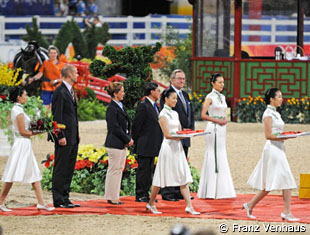 This performance left a strange feeling on the rider and the audience. McDonald left the arena, apologizing to her team mates: "Sorry, guys, "I'm so sorry." One could only feel but very sad: sad for McDonald, as she is always such a class act and one must feel compassionate with her for disappointing her team, and sad for this unlevel mare which was shown once again in an international arena, selected as a team horse by USEF coach Klaus Balkenhol. One could also cry over a typical case of patriotic judging. U.S. judge Rockwell thought he could fix things by overscoring McDonald's ride. While four judges scored the test a 61 or 62%, Rockwell went ape and gave it a staggering 66%!.
This performance left a strange feeling on the rider and the audience. McDonald left the arena, apologizing to her team mates: "Sorry, guys, "I'm so sorry." One could only feel but very sad: sad for McDonald, as she is always such a class act and one must feel compassionate with her for disappointing her team, and sad for this unlevel mare which was shown once again in an international arena, selected as a team horse by USEF coach Klaus Balkenhol. One could also cry over a typical case of patriotic judging. U.S. judge Rockwell thought he could fix things by overscoring McDonald's ride. While four judges scored the test a 61 or 62%, Rockwell went ape and gave it a staggering 66%!.
In an interview with U.S.Equestrian Federation press chef Joanne Morris, McDonald said: “She started spooking when I went in the ring. I have no idea what she was spooking at, I couldn’t put my leg on her. I was totally surprised. I don’t really know what to say, I feel awful for the team. She was so much different than she was in the warm-up she totally took me by surprise.”
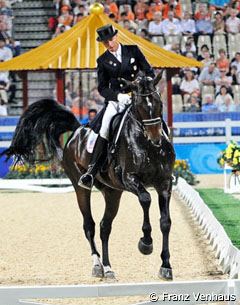 U.S. Dressage Champion Steffen Peters had to pick up the broken pieces with his Dutch warmblood gelding Ravel (by Contango) at their first international outing outside the U.S.A. Ravel is a big boned horse with a superb canter and powerful half passes and extended trots. The zig zag went well, but one can see that Ravel is still green at Grand Prix and needs more balance in it. The two and one tempi's were huge, but Ravel was swooshing his tail a lot in reaction to the leg aids. The right pirouette was good, the left on too quick. Peters and his dark bay gelding rode outstanding piaffes and passages. Especially in passage the horse is very even and engaged. In piaffe there still sometimes is a slight loss of balance as it is quite forward. Their score of 70.000% pushed the U.S.A. back up to a fourth team place. Nota bene, the Danish judge had Peters 3% lower than the others. Coincidence? If Tornblad would have evened it out to 70% it would not have made a difference in the team ranking, though.
U.S. Dressage Champion Steffen Peters had to pick up the broken pieces with his Dutch warmblood gelding Ravel (by Contango) at their first international outing outside the U.S.A. Ravel is a big boned horse with a superb canter and powerful half passes and extended trots. The zig zag went well, but one can see that Ravel is still green at Grand Prix and needs more balance in it. The two and one tempi's were huge, but Ravel was swooshing his tail a lot in reaction to the leg aids. The right pirouette was good, the left on too quick. Peters and his dark bay gelding rode outstanding piaffes and passages. Especially in passage the horse is very even and engaged. In piaffe there still sometimes is a slight loss of balance as it is quite forward. Their score of 70.000% pushed the U.S.A. back up to a fourth team place. Nota bene, the Danish judge had Peters 3% lower than the others. Coincidence? If Tornblad would have evened it out to 70% it would not have made a difference in the team ranking, though.
The top 25 ranked riders have qualified for the Special. The 2008 Olympic format decided that the points of the Grand Prix Special and Grand Prix Kur added up count for the individual medal ranking. The Grand Prix Special is ridden on Saturday August 16, 2008. The top fifteen qualifies for the Kur.
View complete scores here
Photos copyrighted: Franz Venhaus - Dirk Caremans
